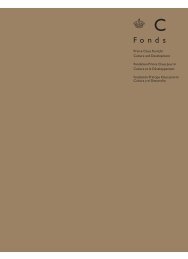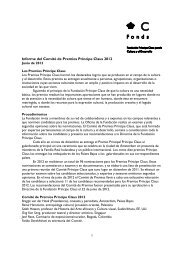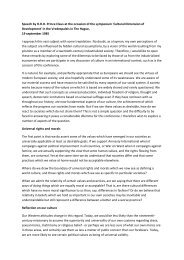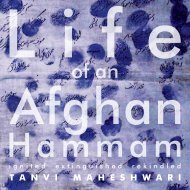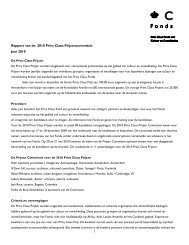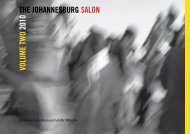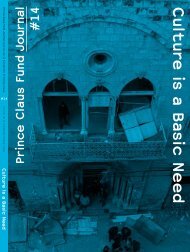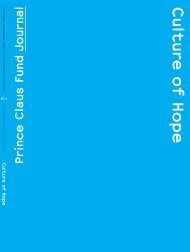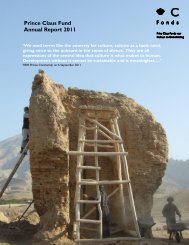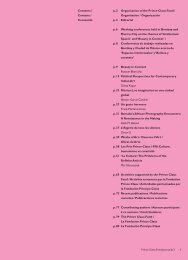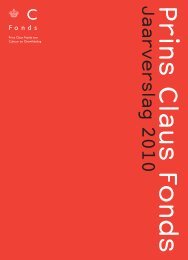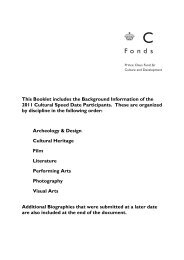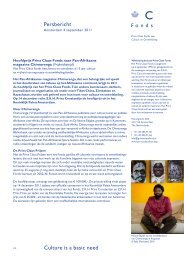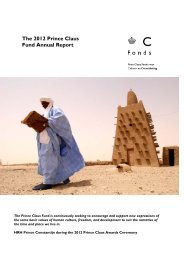3 summer 2011 - Prince Claus Fund
3 summer 2011 - Prince Claus Fund
3 summer 2011 - Prince Claus Fund
- No tags were found...
Create successful ePaper yourself
Turn your PDF publications into a flip-book with our unique Google optimized e-Paper software.
survival among these indigenous Caribbean people give cause for annualcelebration of a Carib Week in Dominica or in the tenacious hold to the name‘Indios’ by inhabitants of the Dominican Republic with drips of non-Caucasianblood in their veins. But the Afro-Carib population of Belize hold on to theirculturally miscegenated ‘being’ in the Garifuna festivals and consciouslypreserved retentions which have gained enormous currency since the 1960’s inthat Caribbean mainland country.To civilisations or cultural aggregations wedded to the notion of homogeneity asthe organising principle of society and the determinant of sense and sensibility,such a multifaceted, multi-layered, pluralistic profile of consciousness andreality is bound to appear complicated rather than merely complex, threatening‘mongrelisation’ of the thoroughbred as an Anglo-Saxon member of Parliamentrecently feared Britain would suffer with the continuing immigration of hordes ofPakistanis, Indians, Africans and West Indians into the United Kingdom.All of Europe seemingly fears this threat with overt or covert anxiety. Pakistanisin northernmost fjords of Norway, Turks in the urban settings of Denmark andSweden or in the factories of Germany and Arabs and West Africans in Paris are allgiving a new ethnographic profile to Western European countries which are becoming‘multi-ethnic’ and ‘multicultural’ and challenging individual countries to a reevaluationof values and ideas of the true basis of power (political and economic)and the structure of governance and the nature of civil society within theirborders. The borderlessness of latter-day globalisation at once seems amenablemore to computerised fiscal transactions and less to organic human mixing. Theold globalisation (under colonialism) at least maintained the class and ethnicdifferences between Caucasian/Christian overlordship and subjugated Negroid/heathen and Asian/Hindu and Muslim labour. Things now seem different, admittedly,in the face of widespread biological miscegenation and the onset of widespreadreligious ecumenism added to which is the universal appeal for a new ‘spirituality’.In the Caribbean such ‘new-found’ problems of Western Europe are age-oldfeatures of the region’s history and development. And the resolution of theinherent conflict continues to be realised through the shaping of cultural lifewith ‘culture’ loosely defined as the expressions that come from the vigorousmix of diverse elements and manifested through language, religion, kinshippatterns, artistic manifestation and collective maxims of prudence serving asphilosophy underpinning politics and economic life.Again, as I have said elsewhere, the entire world is gone ‘creole’, in the Caribbeansense of forging from disparate elements of a ‘village-world’ new expressionschallenging all to a new cosmology. The truth is, the futures of generations ofpeople in the Caribbean were always shaped by the interdependence of thosewho found themselves in encounters of differing kinds. The slave master was highlydependent on the slave and vice versa. In fact the emancipation of the slaveswas the liberation of both masters and slaves since to quote myself, ‘the jailersand the jailed are after all both in jail’. Such is the paradox that has sustainedCaribbean cultural life which continues to manifest contradictory relationships,producing agony but also new life.West Indian Nobel laureate Derek Walcott has grasped the true nature of thephenomenon in his essay ‘The Muse of History’ as follows: ‘The tribe in bondagelearned to fortify itself by the cunning assimilation of the religion of the OldWorld. What seemed to be surrender was redemption. What seemed the loss oftradition was its renewal. What seemed the death of faith was its rebirth.’To achieve this, Caribbean society has long retreated to unassailable areas ofspecificity with rich results in religious expressions and the creative arts (visualand performing) as well as in home-spun philosophy to be found in the region’soral literature (proverbs, storytelling or the ‘contes’ tradition) which houses<strong>Prince</strong> <strong>Claus</strong> <strong>Fund</strong> Reader #1 · Summer <strong>2011</strong> · 70



